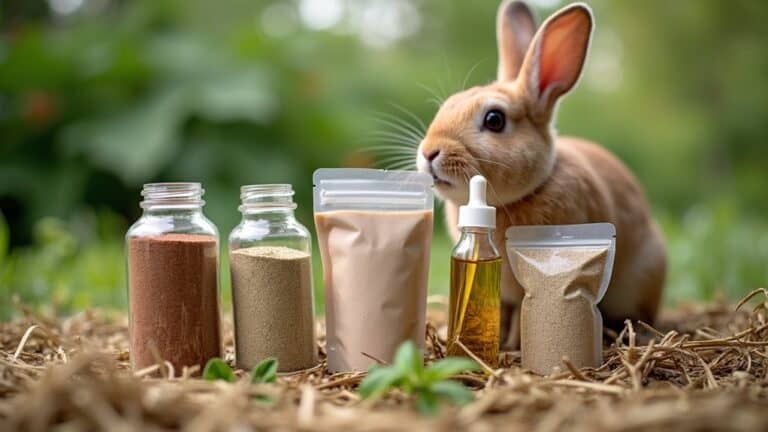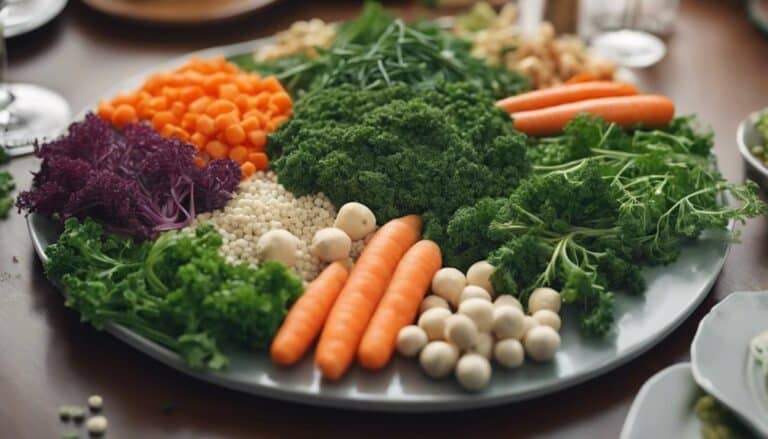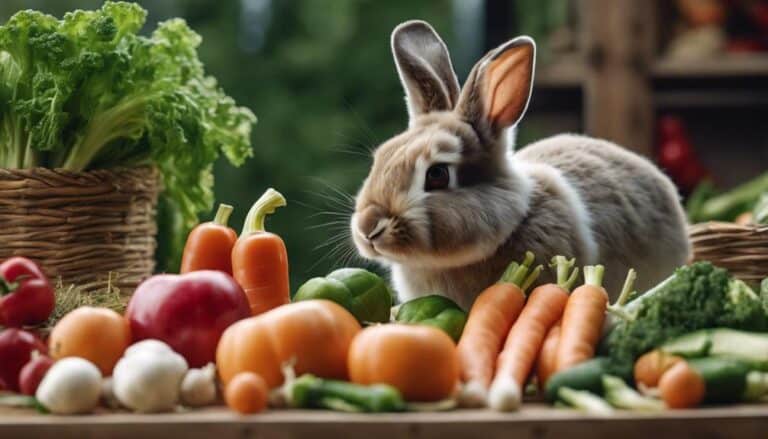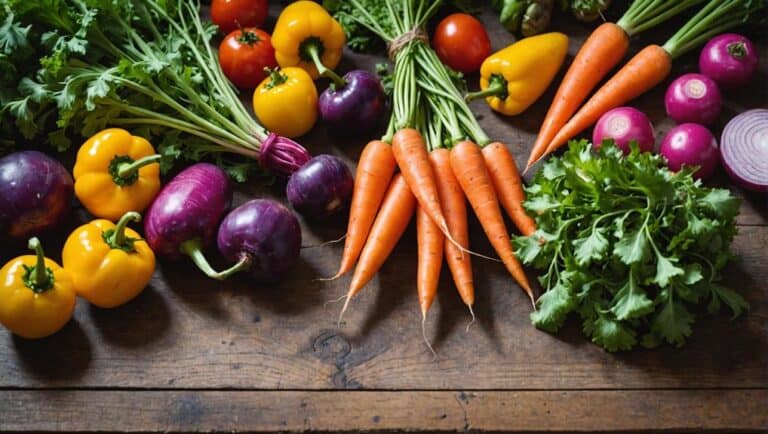Did you know that nearly 50% of rabbit owners overlook the importance of eye health in their pets? It's essential to understand how specific vegetables can play a significant role in maintaining your rabbit's vision. By incorporating a variety of nutrient-rich options into their diet, you can support eye health naturally. But which veggies should you prioritize to guarantee ideal results? Exploring the best choices can help you create a balanced diet that promotes not just eye health, but overall well-being for your furry friend.
Contents
- 1 Importance of Eye Health in Rabbits
- 2 Essential Nutrients for Vision
- 3 Leafy Greens for Eye Support
- 4 Colorful Vegetables and Their Benefits
- 5 The Role of Carrots
- 6 Bell Peppers: A Nutritional Boost
- 7 Other Beneficial Vegetables
- 8 Moderation and Variety in Diet
- 9 Tips for Preparing Rabbit Vegetables
- 10 Maintaining Overall Rabbit Health
- 11 Final Thoughts
Importance of Eye Health in Rabbits
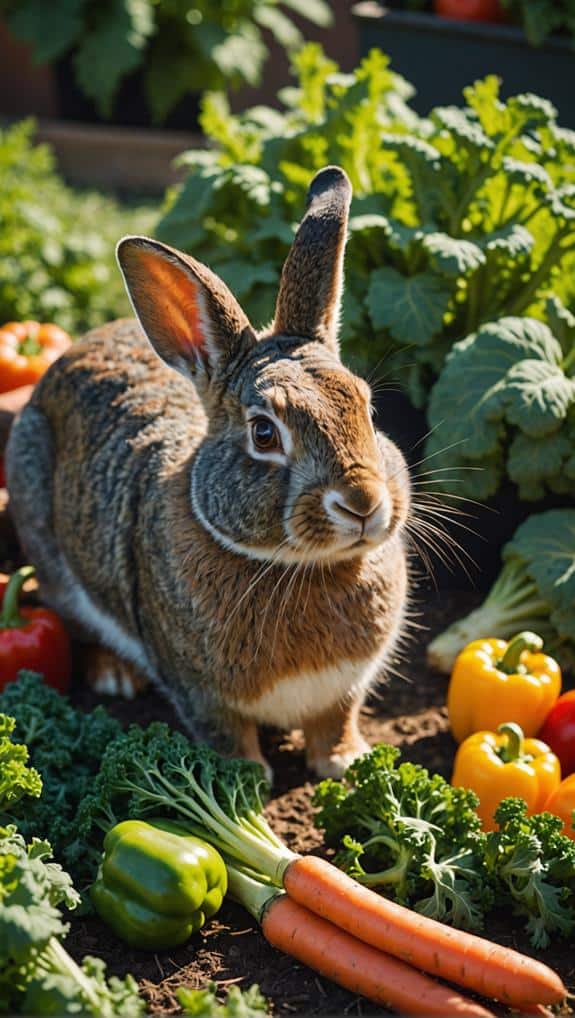
Eye health is essential for rabbits, as their survival relies heavily on clear vision to detect predators from afar. Maintaining ideal eye health guarantees they can navigate their environment safely and respond quickly to threats.
A nutrient-rich diet plays a considerable role in supporting this critical aspect of their well-being. Specifically, vitamins A, C, and E are indispensable for preserving the integrity of a rabbit's eyesight and overall visual function. A balanced diet rich in eye-friendly foods can help prevent common eye problems and guarantee clear vision throughout a rabbit's life.
Insufficient intake of Vitamin A can lead to vision deterioration. To prevent this, make certain to include beta-carotene-rich vegetables like carrots and leafy greens in their diet. These foods not only provide essential nutrients but also enhance their overall health.
Additionally, antioxidants found in bell peppers and dark leafy greens protect rabbit eyes from oxidative stress and damage caused by blue light exposure.
Regular veterinary consultations are equally important, as they help monitor your rabbit's eye health and address any potential vision-related issues that may arise with age.
Essential Nutrients for Vision
To keep your rabbit's vision sharp, focus on key vitamins like A, C, and E.
These essential nutrients, along with antioxidants from vibrant vegetables, play an important role in protecting eye health.
Selecting a variety of nutrient-rich veggies helps guarantee your rabbit gets the support it needs for ideal eye function.
Key Vitamins for Eyes
Maintaining ideal vision in rabbits requires a diet rich in essential vitamins that directly support eye health. A well-balanced diet, including a variety of veggies and fruits, is essential for overall well-being, including eye health.
Vitamin A is vital for vision clarity and helps prevent deterioration of the eyes. Foods high in beta-carotene, such as carrots and sweet potatoes, convert to Vitamin A, ensuring your rabbit maintains proper eye function. Additionally, the importance of fresh hay in a rabbit's diet can't be overstated, as it provides essential fiber and supports digestive health, which indirectly influences overall health, including vision basic dietary needs.
Vitamin C is another key nutrient, as it contributes to tissue repair in the eyes and aids in the absorption of other crucial nutrients for visual health. Incorporating colorful vegetables into your rabbit's diet not only provides Vitamin C but also delivers antioxidants that protect against blue light exposure, further supporting eye health.
Additionally, lutein and zeaxanthin, found in leafy greens, offer antioxidant benefits that shield the eyes from oxidative stress. These nutrients work synergistically, enhancing overall eye function and health.
Importance of Antioxidants
While you may not immediately think of antioxidants when considering your rabbit's diet, these crucial nutrients play a critical role in maintaining ideal vision. Antioxidants protect your rabbit's eyes from oxidative stress caused by free radicals, which can lead to vision deterioration over time. Understanding how to properly care for your rabbit, including recognizing their gender identification challenges, is fundamental for overall health.
Key antioxidants, including vitamins A, C, and E, along with lutein and zeaxanthin, are essential for supporting and enhancing rabbit eye health. Incorporating foods rich in antioxidants, such as dark leafy greens and colorful vegetables, not only bolsters vision but also strengthens overall immune function in your rabbit.
Regular intake of these nutrients can improve vision clarity, particularly in low-light conditions, ensuring your rabbit remains active and alert. Moreover, an antioxidant-rich diet is crucial for long-term eye health, as it safeguards against potential damage from blue light exposure and age-related declines in vision.
Beneficial Vegetables Selection
A diet rich in specific vegetables can greatly enhance your rabbit's eye health by providing essential nutrients. Dark leafy greens like kale and spinach are particularly beneficial, packed with vitamins A, C, and E, along with lutein and zeaxanthin. These nutrients help protect your rabbit's eyes from oxidative stress.
Bell peppers, especially in vibrant colors, are another excellent choice, delivering high levels of vitamins A and C, which are essential for tissue repair.
Don't overlook carrots and sweet potatoes; they're fantastic sources of beta-carotene, which your rabbit's body converts into vitamin A. This vitamin is important for maintaining good vision.
To guarantee a well-rounded nutrient intake, incorporate a variety of vegetables, including broccoli and squash, into your rabbit's diet.
Regular access to fresh, nutrient-dense vegetables contributes greatly to enhanced vision clarity and overall well-being in rabbits. By providing a diverse array of vegetables, you can support their eye health effectively, making a varied diet essential for your pet's best vision and health.
Prioritize these vegetables to keep your rabbit's eyes bright and healthy!
Leafy Greens for Eye Support

Leafy greens play an important role in supporting your rabbit's eye health. Dark leafy greens, such as kale, spinach, and collard greens, are packed with vitamins A, C, and E, which are vital for maintaining healthy vision. These nutrients help protect your rabbit's eyes and contribute to overall eye functionality.
Additionally, leafy greens contain high concentrations of lutein and zeaxanthin—powerful antioxidants that shield eye cells from blue light and oxidative stress. This protection is particularly significant, as it helps your rabbit maintain clarity of vision, especially in low-light conditions.
Incorporating a variety of leafy greens into your rabbit's diet not only supports eye health but also promotes overall well-being.
To meet their nutritional needs, adult rabbits should receive approximately 1 cup of packed leafy greens per 2 lbs of body weight daily. This intake guarantees that they benefit from the essential vitamins and antioxidants necessary for maximum eye function.
Colorful Vegetables and Their Benefits
In addition to leafy greens, colorful vegetables play an important role in enhancing your rabbit's eye health. These vibrant options, such as red and yellow bell peppers, are packed with vitamins A and C. Vitamin A is essential for maintaining vision, while vitamin C acts as an antioxidant, protecting sensitive eye tissues from damage.
Incorporating a variety of colorful vegetables not only diversifies your rabbit's diet but also boosts their intake of necessary nutrients. For instance, squash varieties like zucchini and butternut squash contribute critical antioxidants and nutrients that support overall eye function. These antioxidants help combat oxidative stress, further safeguarding your rabbit's eyesight.
Moreover, the combination of these vegetables with dark leafy greens creates a rich source of carotenoids, which are significant for visual health. Including these colorful vegetables enhances the vitamins and antioxidants available to your rabbit, promoting optimal eye health and preventing potential issues down the line.
The Role of Carrots
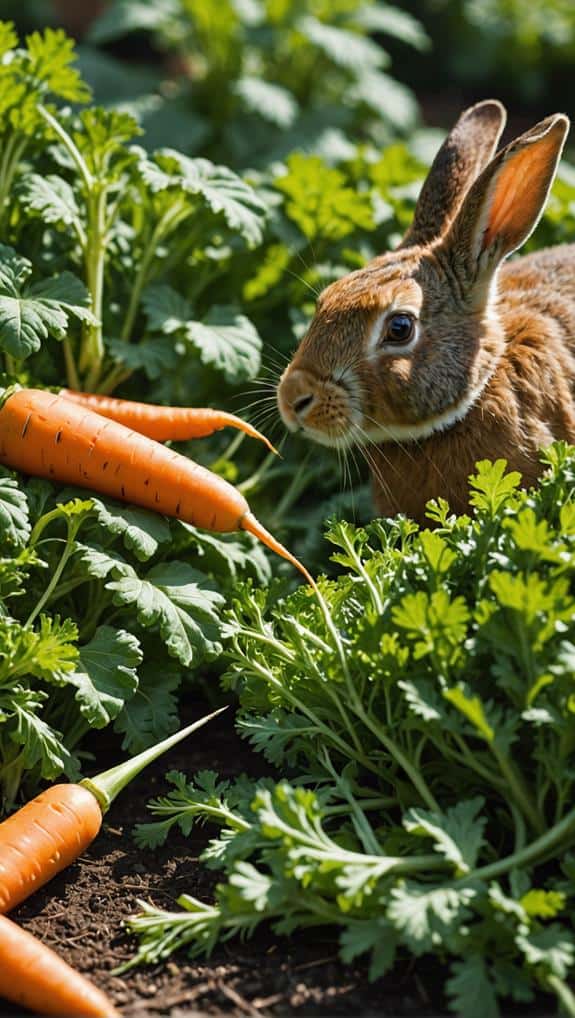
Carrots play an important role in promoting your rabbit's eye health due to their high beta-carotene content, which the body converts into Vitamin A. This crucial nutrient supports vision clarity and overall ocular health.
Incorporating carrots into your rabbit's diet can help prevent Vitamin A deficiency, which can lead to vision issues. However, it's important to offer carrots in moderation because of their high sugar content.
To guarantee your rabbit gets the most benefit from carrots while maintaining balance, consider the following:
- Beta-Carotene Source: Carrots are one of the richest sources of beta-carotene.
- Moderation is Key: Limit carrot intake to avoid excessive sugar and potential skin discoloration.
- Variety in Diet: Pair carrots with dark leafy greens for a nutrient-dense diet.
- Visual Health Support: Regular carrot consumption contributes to better vision and overall health.
- Enhancing Nutritional Value: Combine carrots with colorful vegetables for a well-rounded meal.
Bell Peppers: A Nutritional Boost
Bell peppers are an excellent addition to your rabbit's diet, providing essential vitamins A and C important for maintaining healthy eyes. These colorful vegetables aren't only nutritious but also visually stimulating for your rabbit, encouraging exploration and engagement.
The high levels of vitamin A play a significant role in promoting good vision and supporting overall eye health, while vitamin C acts as a powerful antioxidant. Antioxidants found in bell peppers help protect your rabbit's eyes against oxidative stress, reducing the risk of potential eye problems.
When you offer small pieces of bell peppers as treats, you enhance your rabbit's diet with a delicious, nutrient-rich option that supports their visual clarity. Incorporating bell peppers regularly can complement a balanced diet aimed at optimizing eye health.
You might choose red, yellow, or green bell peppers, each offering unique benefits and flavors. By including bell peppers in your rabbit's meals, you're not just providing essential vitamins; you're also promoting a healthier lifestyle that supports their overall well-being.
Other Beneficial Vegetables
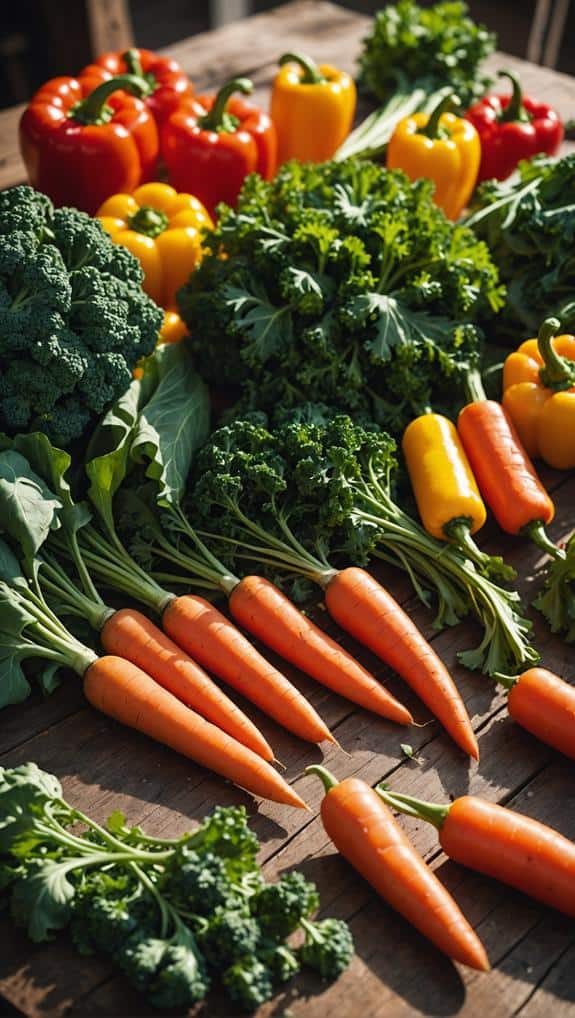
Incorporating nutrient-rich leafy greens like kale and spinach into your rabbit's diet is essential for promoting eye health.
Colorful options, such as bell peppers and carrots, provide crucial vitamins and beta-carotene, which support vision clarity and overall function.
Nutrient-Rich Leafy Greens
Leafy greens play an important role in promoting rabbit eye health, providing necessary nutrients that support vision. Incorporating nutrient-rich leafy greens into your rabbit's diet is essential for maintaining ideal eye function.
Dark leafy greens, such as kale, spinach, and collard greens, are particularly advantageous. They're packed with vitamins A, C, and E, which are critical for eye health.
Consider these benefits of leafy greens:
- Lutein and Zeaxanthin: These antioxidants help protect against oxidative stress and blue light.
- Vitamin A: Important for maintaining good vision and preventing deterioration.
- Vitamin C: Supports overall eye health and boosts the immune system.
- Vitamin E: Acts as an antioxidant, protecting eye cells from damage.
- Fiber: Aids in digestion, promoting overall health.
In addition to leafy greens, try introducing other vegetables like broccoli and squash gradually to avoid digestive issues.
A balanced diet that mixes leafy greens with non-leafy vegetables guarantees your rabbit receives a rich supply of necessary vitamins, helping prevent vision deterioration.
Colorful Bell Pepper Benefits
When you include colorful bell peppers in your rabbit's diet, you're not just adding variety; you're also providing essential nutrients that support eye health. Rich in vitamins A and C, bell peppers play an important role in maintaining your rabbit's vision clarity.
Vitamin A is critical for proper eye function, while vitamin C acts as an antioxidant, protecting against oxidative stress. Moreover, the antioxidants lutein and zeaxanthin found in bell peppers help shield your rabbit's eyes from harmful blue light exposure, further promoting eye health.
Offering small pieces of bell peppers as a treat can enhance the nutritional variety in your rabbit's diet, making it both enjoyable and beneficial. Incorporating bell peppers alongside dark leafy greens, such as kale and spinach, guarantees a balanced intake of eye-nourishing nutrients.
These greens also provide important vitamins A, C, and E, reinforcing your rabbit's overall vision support. By mixing colorful vegetables into your rabbit's diet, you're not only catering to their taste preferences but also prioritizing their long-term eye health.
Carrots and Beta-Carotene
Carrots pack a powerful punch of beta-carotene, an essential nutrient that your rabbit needs for ideal eye health. This vibrant orange vegetable is a precursor to Vitamin A, vital for maintaining good vision. Regular consumption of beta-carotene-rich foods helps guarantee your rabbit's body converts it to Vitamin A, which protects and enhances eye function.
In addition to carrots, you might consider incorporating these other vegetables high in beta-carotene:
- Sweet potatoes: A delicious alternative that rabbits enjoy.
- Mangos: A sweet treat packed with nutrients.
- Pumpkins: Not just for decoration; they're nutritious too!
- Bell peppers: Colorful options that provide essential vitamins.
- Kale: A leafy green rich in antioxidants, supporting overall health.
While carrots are beneficial, remember to feed them in moderation. Excessive beta-carotene can lead to skin discoloration.
Moderation and Variety in Diet
A balanced diet is essential for maintaining your rabbit's eye health, and that means embracing both moderation and variety. Incorporating a wide range of vegetables rich in vitamins A, C, and E is fundamental.
Dark leafy greens should make up 75% of your rabbit's daily vegetable intake, providing essential antioxidants like lutein and zeaxanthin to combat oxidative stress.
While vegetables like carrots can be tempting, it's important to practice moderation. These high-sugar options should comprise no more than 5-10% of your rabbit's total diet to avoid potential weight issues that can negatively impact eye health.
Gradually introducing new vegetables allows your rabbit's digestive system to adjust, ensuring they receive consistent nutrients to support their vision.
Regularly varying the diet not only enhances overall nutrition but also keeps your rabbit interested in their meals. By offering different vitamin-rich vegetables, you can further support their eye health and clarity.
Tips for Preparing Rabbit Vegetables
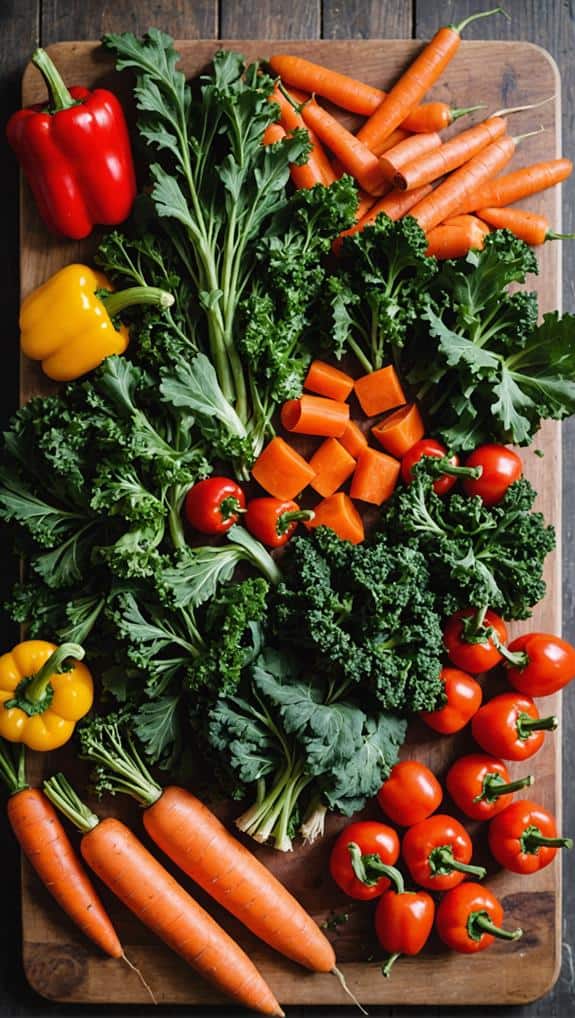
Preparing vegetables for your rabbit is essential for guaranteeing their safety and health. Proper preparation not only enhances the nutritional benefits but also guarantees your furry friend enjoys their meals without any risks. When selecting vegetables, it’s important to choose those that are safe and beneficial for your rabbit’s diet. Always wash the produce thoroughly to remove any pesticides or contaminants, and chop the vegetables into manageable pieces to prevent choking. By providing a variety of fresh veggies for rabbit health, you ensure that your pet receives a balanced diet that supports their overall well-being.
Here are some tips to keep in mind:
- Wash vegetables thoroughly to remove pesticides and contaminants.
- Cut vegetables into small, manageable pieces to facilitate easier consumption and reduce choking hazards.
- Store vegetables in proper containers, like Rubbermaid FreshWorks or OXO Good Grips GreenSaver, to maintain freshness and nutrient quality.
- Introduce new vegetables gradually, observing for any digestive issues to help your rabbit adapt to dietary changes comfortably.
- Prepare a variety of colorful vegetables, including bell peppers and dark leafy greens, to enhance nutritional value and visual appeal.
Maintaining Overall Rabbit Health
Guaranteeing your rabbit enjoys a well-rounded diet is just one aspect of maintaining their overall health. A balanced diet should consist of 70% hay, essential for digestion and nutrient absorption, which directly supports eye health.
Fresh vegetables are also essential, providing vitamins A, C, and E that help maintain good vision and prevent deterioration.
Regular hydration is critical, too. Always make sure your rabbit has constant access to clean water, as it aids nutrient transportation and keeps their eyes moist and healthy.
Routine vet check-ups play an important role in maintaining overall health; they allow for early detection of potential vision issues and make certain your rabbit follows an appropriate diet.
Moreover, engaging your rabbit in regular exercise is fundamental. It promotes overall health, helps maintain good weight, and reduces the risk of health issues that could indirectly affect eye health.
By focusing on these aspects—diet, hydration, veterinary care, and exercise—you'll greatly enhance your rabbit's well-being.
Final Thoughts
By incorporating a vibrant array of vegetables into your rabbit's diet, you're not just feeding them; you're serving a feast of nutrients that can make their eyes sparkle like diamonds. Leafy greens, colorful veggies, and carrots all play an essential role in supporting their vision and overall health. Remember, variety is key. Keep their meals diverse and fresh, and watch as their eye health flourishes, ensuring they see the world in all its colorful glory.

